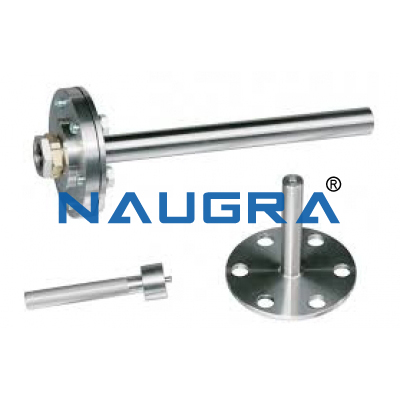- Workshop Tools and Workshop Machines India: buy@naugra.com

Crack Detection In Rotating Shaft Kit .
Crack Detection in Rotating Shaft Kit
Technical Description of Crack Detection in Rotating Shaft Kit
Cracks due to material fatigue are very dangerous for rotating machines. Early detection of any crack is therefore essential before permanent rupture and often fatal consequences can occur. The crack influences the vibration behaviour of the shaft by changing its rigidity. Using suitable analysis software, this change can be registered and inspection of the machine organised in good time. In the experiment, the crack is simulated by an asymmetric flange joint. Variable tightening of the flange bolts produces a temporary gaping of the butt joint, which closely approximates to the behaviour of a crack. The accessory set-up includes two shafts of different lengths: one short and one long. The short shaft simulates a protruding shaft end, and is loaded with the belt drive.
Specification of Crack Detection in Rotating Shaft Kit
Investigation of the vibration behaviour of a cracked shaft
Crack adapter in flange form
Simulation of the crack by opening bolt joints
4 Different sized cracks can be simulated
Short shaft to simulate a protruding shaft end
Long shaft to simulate an elastic rotor
Accessory set-up for machinery diagnostic training system
Stackable box for all components
Technical Data of Crack Detection in Rotating Shaft Kit
Flange diameter: D=90mm
6 Hexagon flange bolts M8x20
Shafts
Diameter: D=20mm
Short shaft: L=85mm
Long shaft: L=200mm
Max. Permissible bending torques
Short shaft for belt pulley: 15,9Nm
Long shaft for mass disk: 3,9Nm
Dimensions and Weight of Crack Detection in Rotating Shaft Kit
l x w x h: 600x400x120mm (box)
Weight: approx. 3kg
Dimensions and Weight of Machinery Diagnostic System, Base Unit
LxWxH: 1.100x800x500mm (base plate + hood)
Weight: approx. 95kg (complete system)
